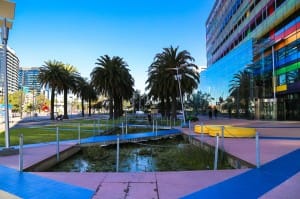Transitioning towards a new sustainable future for urban water
 CRC for Water Sensitive Cities researchers Dr Fjalar de Haan, Dr Briony Rogers and Prof Rebekah Brown, along with Dutch collaborator Niki Frantzeskaki, recently contributed an editorial to a special edition of the Elsevier journal Environmental Innovation and Societal Transitions exploring transitions in urban water.
CRC for Water Sensitive Cities researchers Dr Fjalar de Haan, Dr Briony Rogers and Prof Rebekah Brown, along with Dutch collaborator Niki Frantzeskaki, recently contributed an editorial to a special edition of the Elsevier journal Environmental Innovation and Societal Transitions exploring transitions in urban water.
The authors discuss the need for a global focus for studying the current and potential future shifts towards urban water sustainability in their article ‘Transitions through a lens of urban water’.
Changing urban water practice for the better is a sustainability and transition challenge, made more difficult due to the fact that a properly functioning urban water system is currently dependent on natural water ecosystems.
“Not only does urban water servicing impact on ecosystems, but it also critically depends on the health of the ecosystems and natural environmental rhythms such as rainfall,” they wrote.
Some of the transition themes being explored include “providing a diversity of water supply options, not viewing water as a disposable good, removing pollution from wastewater, improving waterway health, installing adaptable and flexible infrastructure that can cope with extremes, recognising that urban water planning ties in with urban design and managing the interactions between energy, food, heat, amenity and water.”
The special issue contains eight research articles from researchers and institutes around the world (including by other CRCWSC researchers) on a variety of urban water management and transitions topics including transitioning from piped drainage to alternatives in a number of countries, integrated flood risk management in the Netherlands and the diffusion of grey water recycling in Spain.
Prof Brown is the Project Leader for Cities as Water Supply Catchments – Society and Institutions (A4.1), Dr Rogers is Deputy Program A Leader and
Dr de Haan is part of the Socio-technical modelling tools to examine urban water management scenarios (A4.3) research team.
Read the abstract (full article is available by subscription or directly from the authors) at:
https://www.sciencedirect.com/science/article/pii/S2210422414000902